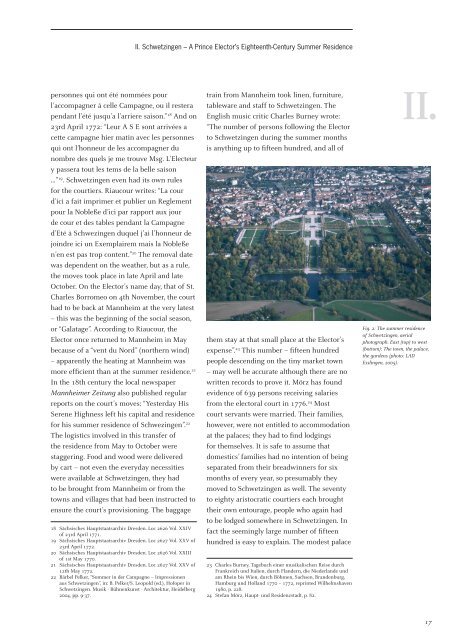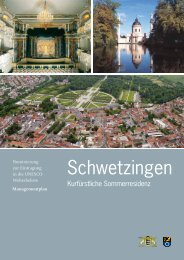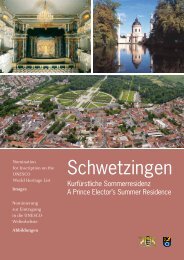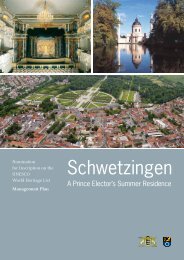II. - Schloss Schwetzingen
II. - Schloss Schwetzingen
II. - Schloss Schwetzingen
You also want an ePaper? Increase the reach of your titles
YUMPU automatically turns print PDFs into web optimized ePapers that Google loves.
personnes qui ont été nommées pour<br />
l’accompagner à celle Campagne, ou il restera<br />
pendant l’été jusqu’a l’arriere saison.” 18 And on<br />
23rd April 1772: “Leur A S E sont arrivées a<br />
cette campagne hier matin avec les personnes<br />
qui ont l’honneur de les accompagner du<br />
nombre des quels je me trouve Msg. L’Electeur<br />
y passera tout les tems de la belle saison<br />
…” 19 . <strong>Schwetzingen</strong> even had its own rules<br />
for the courtiers. Riaucour writes: “La cour<br />
d’ici a fait imprimer et publier un Reglement<br />
pour la Nobleße d’ici par rapport aux jour<br />
de cour et des tables pendant la Campagne<br />
d’Eté à Schwezingen duquel j’ai l’honneur de<br />
joindre ici un Exemplairem mais la Nobleße<br />
n’en est pas trop content.” 20 The removal date<br />
was dependent on the weather, but as a rule,<br />
the moves took place in late April and late<br />
October. On the Elector’s name day, that of St.<br />
Charles Borromeo on 4th November, the court<br />
had to be back at Mannheim at the very latest<br />
– this was the beginning of the social season,<br />
or “Galatage”. According to Riaucour, the<br />
Elector once returned to Mannheim in May<br />
because of a “vent du Nord” (northern wind)<br />
– apparently the heating at Mannheim was<br />
more effi cient than at the summer residence. 21<br />
In the 18th century the local newspaper<br />
Mannheimer Zeitung also published regular<br />
reports on the court’s moves: “Yesterday His<br />
Serene Highness left his capital and residence<br />
for his summer residence of Schwezingen”. 22<br />
The logistics involved in this transfer of<br />
the residence from May to October were<br />
staggering. Food and wood were delivered<br />
by cart – not even the everyday necessities<br />
were available at <strong>Schwetzingen</strong>, they had<br />
to be brought from Mannheim or from the<br />
towns and villages that had been instructed to<br />
ensure the court’s provisioning. The baggage<br />
18 Sächsisches Hauptstaatsarchiv Dresden. Loc 2626 Vol. XXIV<br />
of 23rd April 1771.<br />
19 Sächsisches Hauptstaatsarchiv Dresden. Loc 2627 Vol. XXV of<br />
23rd April 1772.<br />
20 Sächsisches Hauptstaatsarchiv Dresden. Loc 2626 Vol. XX<strong>II</strong>I<br />
of 1st May 1770.<br />
21 Sächsisches Hauptstaatsarchiv Dresden. Loc 2627 Vol. XXV of<br />
12th May 1772.<br />
22 Bärbel Pelker, “Sommer in der Campagne – Impressionen<br />
aus <strong>Schwetzingen</strong>”, in: B. Pelker/S. Leopold (ed.), Hofoper in<br />
<strong>Schwetzingen</strong>. Musik - Bühnenkunst - Architektur, Heidelberg<br />
2004, pp. 9-37.<br />
<strong>II</strong>. <strong>Schwetzingen</strong> – A Prince Elector’s Eighteenth-Century Summer Residence<br />
train from Mannheim took linen, furniture,<br />
tableware and staff to <strong>Schwetzingen</strong>. The<br />
English music critic Charles Burney wrote:<br />
“The number of persons following the Elector<br />
to <strong>Schwetzingen</strong> during the summer months<br />
is anything up to fi fteen hundred, and all of<br />
them stay at that small place at the Elector’s<br />
expense”. 23 This number – fi fteen hundred<br />
people descending on the tiny market town<br />
– may well be accurate although there are no<br />
written records to prove it. Mörz has found<br />
evidence of 639 persons receiving salaries<br />
from the electoral court in 1776. 24 Most<br />
court servants were married. Their families,<br />
however, were not entitled to accommodation<br />
at the palaces; they had to fi nd lodgings<br />
for themselves. It is safe to assume that<br />
domestics’ families had no intention of being<br />
separated from their breadwinners for six<br />
months of every year, so presumably they<br />
moved to <strong>Schwetzingen</strong> as well. The seventy<br />
to eighty aristocratic courtiers each brought<br />
their own entourage, people who again had<br />
to be lodged somewhere in <strong>Schwetzingen</strong>. In<br />
fact the seemingly large number of fi fteen<br />
hundred is easy to explain. The modest palace<br />
23 Charles Burney, Tagebuch einer musikalischen Reise durch<br />
Frankreich und Italien, durch Flandern, die Niederlande und<br />
am Rhein bis Wien, durch Böhmen, Sachsen, Brandenburg,<br />
Hamburg und Holland 1770 – 1772, reprinted Wilhelmshaven<br />
1980, p. 228.<br />
24 Stefan Mörz, Haupt- und Residenzstadt, p. 82.<br />
<strong>II</strong>.<br />
Fig. 2: The summer residence<br />
of <strong>Schwetzingen</strong>, aerial<br />
photograph. East (top) to west<br />
(bottom): The town, the palace,<br />
the gardens (photo: LAD<br />
Esslingen, 2005).<br />
17






